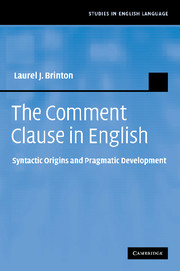Book contents
- Frontmatter
- Contents
- List of figures
- List of tables
- Acknowledgments
- List of abbreviations
- 1 Introduction: comment clauses, parentheticals, and pragmatic markers
- 2 Semantic and syntactic development of pragmatic markers
- 3 Processes of change
- 4 Comment clauses with say
- 5 I mean
- 6 Comment clauses with see
- 7 If you will and as it were
- 8 Comment clauses with look
- 9 What's more and what else
- 10 Epistemic/evidential parentheticals – I gather and I find
- 11 Concluding remarks
- References
- Author index
- Subject index
9 - What's more and what else
Published online by Cambridge University Press: 12 July 2009
- Frontmatter
- Contents
- List of figures
- List of tables
- Acknowledgments
- List of abbreviations
- 1 Introduction: comment clauses, parentheticals, and pragmatic markers
- 2 Semantic and syntactic development of pragmatic markers
- 3 Processes of change
- 4 Comment clauses with say
- 5 I mean
- 6 Comment clauses with see
- 7 If you will and as it were
- 8 Comment clauses with look
- 9 What's more and what else
- 10 Epistemic/evidential parentheticals – I gather and I find
- 11 Concluding remarks
- References
- Author index
- Subject index
Summary
Introduction
The third type of comment clause identified by Quirk et al. (1985:1112, 1117) resembles a “nominal” or free relative clause. The examples they list include what's more surprising, what's more serious, what's most significant of all, what's very strange, and what annoys me. This chapter examines two constructions, what's more (§9.2–§9.4) and, in less detail, what else (§9.5).
What's more in Present-day English
In the what's more construction, according to the OED, the what-clause is “a prefatory (usually parenthetic) qualifying clause” (s.v. what, def. CI3b); what has a relative (or allied) use and more is a pronoun meaning ‘something of greater importance or significance’ (OED: s.v. more, def. BIc). While what's more normally stands in extraposition, it is sometimes interpolated and stands in apposition to some word or phrase or even an implied idea (Poutsma 1917:971; Jespersen 1961 [1927]:113; Curme 1935:46).
The variants of parenthetical what's more encountered in Present-day English are what's more, what is more, and what was more, as illustrated below:
(1) a. It's called being generous. What's more, you don't have to be cashed-up (2001 Heat 27 Oct. 120/1 [OED]).
b. “Speaks Welsh like a book, the professor” and, what's more, he also writes it like a book though he learnt it late in life (1960 Sunday Times 27 Nov. 11 [OED]).
c. A FILM is a film and a play is a play. What is more, they have, for the most part, entirely different audiences (1991 The Guardian 18 April, p. 13 [FLOB]).
- Type
- Chapter
- Information
- The Comment Clause in EnglishSyntactic Origins and Pragmatic Development, pp. 203 - 218Publisher: Cambridge University PressPrint publication year: 2008



